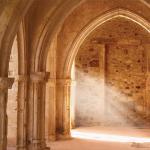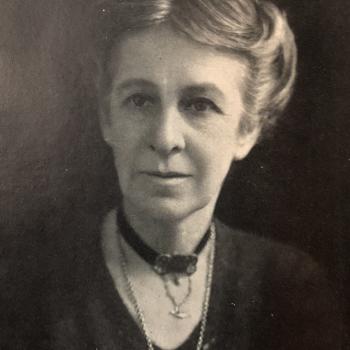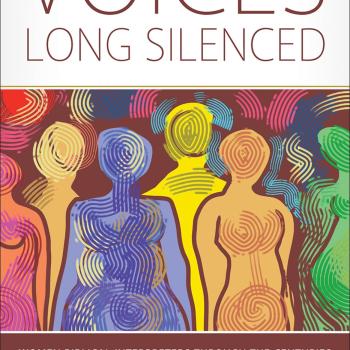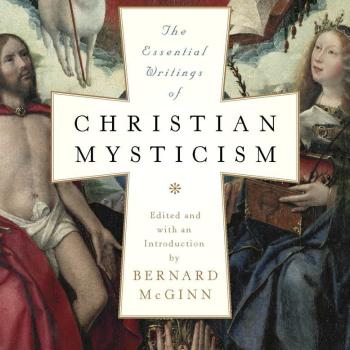A note from Carl: It was forty years ago this summer — the summer of 1979 — that I first discovered Evelyn Underhill, the British spiritual author whose writings introduced me to the beauty and splendor of Christian mysticism. To celebrate this personal anniversary, I’m reprinting here a blog post I wrote back in 2007 about her and her writing. I hope you enjoy it.
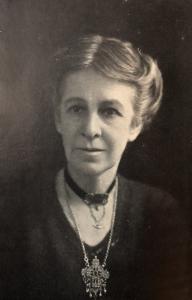
It might be a bit controversial for me to include Evelyn Underhill in my list of western mystics. To the best of my knowledge, she never claimed to be a mystic herself, and her work was aimed more at introducing her readers to the history and theory of mysticism than in asserting any spiritual or mystical authority of her own. In other words, Underhill was a great popularizer of mysticism, similar to how Alan Watts was a popularizer of Zen or Michael Harner a popularizer of shamanism.
But her knowledge of the subject was so vast, her work so thorough and wide-ranging, and her interest in the spiritual welfare of those who corresponded with her or who participated in the retreats she led was both so genuine and so wise, that she deserves to be included in the roster of western mystics at least as much as theologians like Bernard of Clairvaux or Thomas Aquinas, whose claim to mystical fame lies as much in their intellectual achievement as in any personal spiritual experience.
A Twentieth Century Mysticism
Hers is truly a twentieth century mysticism, more democratic than aristocratic in its focus: in other words, she champions not so much extraordinary moments of divine union as experienced by an elite few, but rather a more down-to-earth but no less life-transforming encounter with divine grace that is available to, as she put it, “normal people” — in other words, the ordinary person who may or may not be an ordained minister, a consecrated monk or nun, or an erudite scholar. Underhill introduced the average person to extraordinary spirituality, and in doing so, celebrated the idea that anybody — regardless of pedigree, background, education, or religious vocation — just might be able to scale those visionary heights.
She lived from 1875 to 1941, which makes her a contemporary of Thérèse of Lisieux and Pierre Teilhard de Chardin. Born into a well-to-do British family, she married a barrister with whom she bore no children, leaving her free to write — and write she did.
Although not as prolific as Thomas Merton, she wrote three novels, as many volumes of poetry, a collection of medieval tales of the Virgin Mary, and over twenty specifically religious books, including collections of essays and transcripts of radio talks she did on the spiritual life.
She also edited and wrote introductions for a variety of mystical classics, including The Cloud of Unknowing, Walter Hilton’s Scale of Perfection, and an anthology of writings by John Ruysbroeck, her personal favorite of the great mystics. Her masterpiece, Mysticism: A Study in the Nature and Development of Spiritual Consciousness was released in 1911, when she was only in her mid-thirties; other key works include Practical Mysticism, Mystics of the Church, and Worship. Although her later works tend to be more oriented toward ordinary Christian spirituality than toward “mysticism” per se, all of her writing is imbued with a deep sense of the glory and possibility of a spiritual life wholly given to the love of God and the desire for Divine Union.
A Mystic for Everyone
Born into an Anglican family, her love of mysticism and her work with a Catholic spiritual director (Friedrich von Hügel) naturally led her to an interest in entering the Church of Rome, but she felt repelled by the anti-modernist views of Pope Pius X and, once she married her Anglican husband, decided that it was God’s will for her to remain within the Church of England. This she did for the duration of her life, where in addition to writing her numerous books and essays she also delivered lectures (she was the first woman to lecture on religion at Oxford University), led retreats, and engaged in works of mercy, devoting one day a week to charitable work among the London poor.
Underhill’s writing is literary and elegant; clearly the product of a 19th century British education. She does a splendid job at expressing the miraculous reality of the mystical life and how it can transform “ordinary reality” into a life shimmering with the Divine Presence. Her perspective is clearly Christian, but her own Anglican identity never impedes her vision, and consequently hers is a celebration of mysticism that can be appreciated by all branches of the Christian family tree. I think her work is essential for anyone seeking an authentic Christian mysticism that refuses to be confined by its historical boundary of the cloister.
For further reading:
I. Selected works by Evelyn Underhill
- Mysticism: A Study in the Nature and Development of Spiritual Consciousness
- Practical Mysticism: A Little Book For Normal People
- The Essentials of Mysticism
- The Life of the Spirit and the Life of Today
- The Mystics of the Church
- The Golden Sequence
- Worship
- The Spiritual Life
- The Letters of Evelyn Underhill
- The Mount of Purification
- An Anthology of the Love of God
- The Evelyn Underhill Reader
- The Ways of the Spirit
- Evelyn Underhill: Essential Writings
- Radiance: A Spiritual Memoir
II. Books about Underhill:
- Christopher Armstrong, Evelyn Underhill, 1875-1941: An Introduction to Her Life and Writings
- Annice Callahan, Evelyn Underhill: Spirituality for Daily Living
- Margaret Cropper, The Life of Evelyn Underhill: An Intimate Portrait of the Ground-Breaking Author of Mysticism
- Dana Greene, Evelyn Underhill: Artist of the Infinite Life
- Mary Xavier Kirby, The Writings of Evelyn Underhill: A Critical Analysis
- Ann Loades, Evelyn Underhill (Fount Christian Thinkers)
Finally, here’s a bit of personal trivia: her birthday was December 6, a day she shares with Dave Brubeck, Dion Fortune, Henryk Górecki, and… me!
Enjoy reading this blog?
Click here to become a patron.




